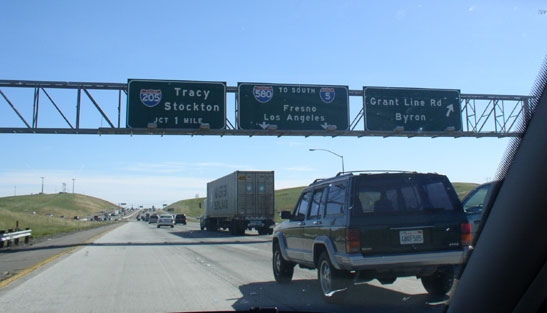On the Road: South Main, Los Angeles, California
Click on Thumbnail for MapNote: First published on Blogger on April 29, 2007
Unfolding the Map
We've hit L.A., and will be moving in and around this large city for the next few posts. It is the city of lights and dreams for some, but does Sal get fame and fortune? Read on and see. Click on the map to see where we are presently.
Book Quote
"We got off the bus at Main Street, which was no different from where you get off a bus in Kansas City or Chicago or Boston -- red brick, dirty, characters drifting by, trolleys grating in the hopeless dawn, the whorey smell of a city....
"South Main Street, where Terry and I took strolls with hot dogs, was a fantastic carnival of lights and wildness. Booted cops frisked people on practically every corner. The beatest characters of the country swarmed on the sidewalks -- all of it under those soft Southern California stars that are lost in the brown halo of the huge desert encampment LA really is. You could smell tea, weed, I mean marijuana, floating in the air, together with the chili beans and beer. That grand wild sound of bop floated from beer parlors; it mixed medleys with every kind of cowboy and boogie-woogie in the American night. Everybody looked like Hassel. Wild Negroes with bop caps and goatees came laughing by; then long-haired broken down hipsters straight off Route 66 from New York; then old desert rats, carrying packs and heading for a park bench at the Plaza; then Methodist ministers with raveled sleeves, and an occasional Nature Boy saint in beard and sandals. I wanted to meet them all, talk to everybody, but Terry and I were too busy trying to get a buck together."
On the Road, Chapter 13
South Main Street, Los Angeles, California
Boy, is this a description of L.A. from the past! Nowadays we all have an image of Los Angeles. I bet you can think of a few of them from the top of your heads. Let's see: smog, traffic jams, movie and television stars, glamour, sunshine, beaches, parties, Academy Awards.
I have a confession to make. As I've said before, I'm a native Californian. I grew up in the northern half of the state, and as I've also said before in a previous post, the northern half of California has little love for the southern half of the state. So, in that spirit, I didn't truly visit Los Angeles until I was about 40 years old, and that was only because I went to a wedding.
Yet to fully understand all of California, you have to understand all of its parts. I'm still learning. I've now been in the L.A. area twice, and only for a short time. I wish that I had seen the L.A. that Sal describes. This L.A. sounds vibrant, interesting and condensed, like a city should be.
I suppose I should describe a little of what he saw, this carnival he writes of. Bop, of course, is the popular jazz of the day, the sounds of which permeates the the city. In the late 40s and early 50s, bop was the music that the most cutting edge people listened to. Hassel was the name Kerouac used as a pseudonym in On the Road for Herbert Huncke, who impressed Kerouac with his free-will choice to live off the streets by a life of petty crime. Hipsters were the counter-cultural crowd of the time, Jack's spiritual and ideological contemporaries, who loved jazz, experimented with drugs and had their own slang. They are somewhat distinct from what we now refer to as "hipsters." Desert rats were people who lived in rural (deserty) areas of the southwest U.S. Nature Boys were followers of the lifestyle espoused by Robert "Gypsy Boots" Bootzin, who was one of the earliest proponents of an organic lifestyle, including veganism, yoga, organics, and may have opened the first health food store in the world.
This melange of characters seem to be all located in one centralized location, which does not fit the images that most people, or at least I, have of L.A. Los Angeles seems to be very spread out and to not encourage this centralization. Perhaps back in the 40s, L.A. had a more big city feel to it, perhaps more of a grittiness and melting pot feel than today. I wonder if South Main Street is still like he describes, or if the character of it has changed or moved somewhere else in the city? Regardless, L.A. has become a destination that I would travel to again, based on my limited experience, because in places it is beautiful, there are still interesting people to watch and meet, and there are attractions that fit my definition of interesting.
If you want to learn more about South Main Street, Los Angeles, Nature Boys, Herbert Huncke and hipsters. Don't worry, we'll get to jazz and bop soon.
Beat Museum: Herbert Huncke
Gypsy Boots' Homepage
Herbert Huncke interview
Making a Life in South Los Angeles
The Morning News: Do You have Hipsters
Wikipedia: Herbert Huncke
Wikipedia: Hipsters in the 1940s
Wikipedia: Hipsters (contemporary)
Wikipedia: Robert "Gypsy Boots" Bootzin
Wikipedia: South Los Angeles
Next up: Sunset and Vine, Los Angeles, California
 California,
California,  Jack Kerouac,
Jack Kerouac,  Los Angeles,
Los Angeles,  On the Road,
On the Road,  Sal Paradise,
Sal Paradise,  beat,
beat,  beatnik,
beatnik,  bebop,
bebop,  hipsters,
hipsters,  nature boys,
nature boys,  veganism,
veganism,  yoga in
yoga in  On the Road
On the Road 






